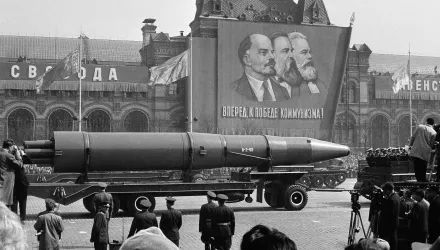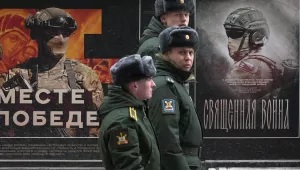"Shadow Government" Blog
Russia is violating Ukrainian sovereignty and international law by sending troops to seize communications, transportation, and governmental hubs on the Crimean peninsula. As of this writing, those forces are reportedly digging in, and the Russian senate passed a resolution authorizing even broader use of force against Ukraine. Soldiers violating borders to seize territory in Europe is a grave matter, reminiscent of a darker past that Europe has tried to escape.
What has Barack Obama's administration done to respond? The first statement by the U.S. president failed to deter the Russians. His key sentence was "The United States will stand with the international community in affirming that there will be costs for any military intervention in Ukraine." Russian forces blew past that warning like tanks at an unguarded checkpoint. A later 90-minute phone call between Obama and Russian Vladimir Putin yielded no better results.
The most urgent matter is to re-establish the American credibility so regrettably squandered over the past several years -- in Afghanistan by simultaneously announcing a surge and a retreat, in Iran with unenforced and ever-moving red lines, and in Syria with incomprehensible vacillation that left Syrian President Bashar al-Assad in a stronger position after American threats. Credibility is the coin of the realm in international politics. Allies and adversaries need to know again that America will defend its interests. When the president speaks of "consequences" and "costs" associated with violations of international law and failure to comply with arms control and nonproliferation agreements, the country cannot afford to have other nations doubt his resolve.
A first step toward repairing America's damaged credibility would be a strategic plan to deal with the Ukraine crisis along three broad lines of action. These include both immediate measures to address the current crisis and longer-term steps for the United States and its allies to regain the strategic initiative.
First, recognizing that this is ultimately Ukraine's fight, not America's, the United States must help form a diplomatic coalition in support of democratic leaders in Kiev. The coalition should commit to democracy and territorial integrity for Ukraine. It should demand removal of Russian forces introduced over the last several days, a return to bases for Russian personnel, and an end to threatening exercises and intimidation. Most of all, the United States should rally economic support for Ukraine from the European Union and the International Monetary Fund. Secretary of State John Kerry's announced visit to Kiev on Tuesday, March 4, is also a good start.
Second, the president's warning that there will be costs associated with military intervention must be made real. This does not mean the introduction of U.S. forces into Ukraine, but a series of steps to show the resolve of an American-led international order. Simply put, we must deter further Russian aggression. Rather than simply threatening to withdraw U.S. participation in planning for the Sochi G-8 meeting, that meeting should be moved outside Russia. Putin should be warned that if Russian aggression persists, the other members will expel Russia and restore the G-7 to its original membership of industrialized democracies -- not autocratic kleptocracies. Planning should begin to impose travel restrictions and asset freezes targeting those who ordered the aggression in Ukraine. Obama should visit Kiev soon as a visible show of support for the new government. The Magnitsky Act provisions should be implemented against senior-level Russian leaders on a carefully targeted basis. A French deal to deliver two Mistral-class helicopter assault ships in November 2014 and 2015 should be scrapped, most of all because those vessels would be ideal for supporting the Russian aggression now under way.
Third, at the strategic level the administration must finally recognize that the "reset" with Russia is a failure and prepare for a different relationship with Moscow. This does not mean another Cold War (and any nostalgic efforts to romanticize that horrific conflict, as a couple of Republican legislators recently did, should be emphatically rejected). But the United States should acknowledge that Putin and his model of authoritarian capitalism have declared themselves opposed to American interests and values.
Instead the United States should end the archaic restrictions on the export of natural gas (which currently requires an onerous web of regulatory approvals) and the ban on the export of American oil. The United States is now the world's largest natural gas producer. Facilitating American natural gas exports will provide Europeans with an alternative energy source and erode Russia's leverage over them. The president's promised "flexibility" on missile defense after his re-election is best forgotten, and the administration must hold Moscow accountable for its apparent violations of the Intermediate-Range Nuclear Forces Treaty. If Kiev agrees, the West should move forward with E.U. economic -- but not NATO military -- agreements. Finally, the president's announced decision to reduce the U.S. Army to a pre-World War II troop strength should be reversed.
Obama now faces one of the most severe national security tests of his administration. The results of his exam will be studied in Tehran, Pyongyang, Damascus, and Beijing -- as well as in London, Paris, Berlin, and Tokyo. Too many times he has given reason to doubt his resolve to defend vigorously American and allied interests. He can begin to repair that damage and restore American credibility with a steadfast response to Russian aggression in Ukraine. All Americans should support him on that point. A watching world waits to see whether America will lead from the front.
Tobey, William and Will Inboden. “Responding to Russian Aggression in Ukraine and Restoring U.S. Credibility.” Foreign Policy, March 3, 2014




